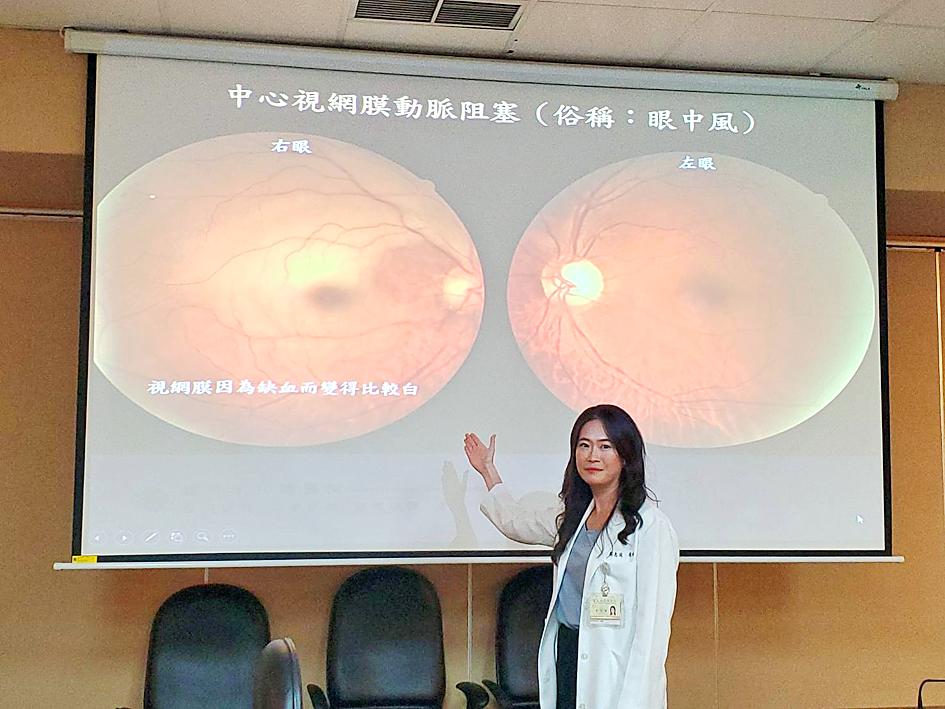Exposure to air pollution can cause a person to be 2.16 times more likely to experience eye strokes, which can cause vision loss, researchers in Taipei said yesterday.
Analyzing National Health Insurance Administration data and data from air-quality and weather sensors nationwide, a team of researchers from Taipei Veterans General Hospital, National Yang-Ming University, and Yuan Ze University found a correlation between air pollution and the occurrence of eye strokes.
An increase of air pollution over a one-week period by just one part per billion can cause those exposed to be 1.1 times more likely to experience an eye stroke, the team said.

Photo: Lin Hui-chin, Taipei Times
Diabetics, people with high blood pressure, high cholesterol or other pre-existing conditions face an even higher risk: They are 1.4 to 2.16 times as likely to have an eye stroke, the team said.
Neuro-ophthalmologist Cheng Hui-chen (鄭惠禎) said that eye strokes occur when there is insufficient blood flow to the tissues in the front part of the optic nerve, and while such strokes are sudden and painless, they can result in serious vision loss.
One patient she treated, a 67-year-old man, had lost the sight in his right eye, due to a lack of blood flow to the eye, she said.
Fortunately, using angiography, injections to dissolve blood clots in the optical arteries and hyperbaric oxygen therapy, doctors were able to largely restore the man’s vision, Cheng said.
Doctors already know about the link between air pollution and an increased risk of conjunctivitis, xerophthalmia (abnormal drying of the eye), retinal-vein occlusion and other conditions, but the research team hoped to expand upon those findings with their project, she said.
In the study, the team looked at 93 patients who had experienced eye strokes between 2001 and 2013, and compared their details with the data from 603 weather sensors and 78 air-quality sensors near the patients’ homes, she said.
The team found that an increase in air pollutants such as nitrogen dioxide, sulfur dioxide and fine particulate matter of 2.5 micrometers (PM2.5) or PM10 correlated with a significant increase in the rate of eye strokes, she said.
Air pollutants can enter the optical veins through the respiratory tract, passing from the veins in the lungs to those in the eyes through the circulatory system, and causing blockages when they reach the eyes, she said.
One way to reduce the risk of eye strokes is to reduce exposure to air pollution by using public transportation instead of riding scooters, she said.
The elderly and those with preexisting conditions should also wear masks on days when pollution levels are high, she said.

Taiwan has received more than US$70 million in royalties as of the end of last year from developing the F-16V jet as countries worldwide purchase or upgrade to this popular model, government and military officials said on Saturday. Taiwan funded the development of the F-16V jet and ended up the sole investor as other countries withdrew from the program. Now the F-16V is increasingly popular and countries must pay Taiwan a percentage in royalties when they purchase new F-16V aircraft or upgrade older F-16 models. The next five years are expected to be the peak for these royalties, with Taiwan potentially earning

STAY IN YOUR LANE: As the US and Israel attack Iran, the ministry has warned China not to overstep by including Taiwanese citizens in its evacuation orders The Ministry of Foreign Affairs (MOFA) yesterday rebuked a statement by China’s embassy in Israel that it would evacuate Taiwanese holders of Chinese travel documents from Israel amid the latter’s escalating conflict with Iran. Tensions have risen across the Middle East in the wake of US and Israeli airstrikes on Iran beginning Saturday. China subsequently issued an evacuation notice for its citizens. In a news release, the Chinese embassy in Israel said holders of “Taiwan compatriot permits (台胞證)” issued to Taiwanese nationals by Chinese authorities for travel to China — could register for evacuation to Egypt. In Taipei, the ministry yesterday said Taiwan

‘LIKE-MINDED PARTNER’: Tako van Popta said it would be inappropriate to delay signing the deal with Taiwan because of China, adding he would promote the issue Canadian senators have stressed Taiwan’s importance for international trade and expressed enthusiasm for ensuring the Taiwan-Canada trade cooperation framework agreement is implemented this year. Representative to Canada Harry Tseng (曾厚仁) in an interview with the Central News Agency (CNA) said he was increasingly uneasy about Ottawa’s delays in signing the agreement, especially as Ottawa has warmed toward Beijing. There are “no negotiations left. Not only [is it] initialed, we have three versions of the text ready: English, French and Mandarin,” Tseng said. “That tells you how close we are to the final signature.” Tseng said that he hoped Canadian Prime Minister Mark Carney

Taiwan is awaiting official notification from the US regarding the status of the Agreement on Reciprocal Trade (ART) after the US Supreme Court ruled US President Donald Trump's global tariffs unconstitutional. Speaking to reporters before a legislative hearing today, Premier Cho Jung-tai (卓榮泰) said that Taiwan's negotiation team remains focused on ensuring that the bilateral trade deal remains intact despite the legal challenge to Trump's tariff policy. "The US has pledged to notify its trade partners once the subsequent administrative and legal processes are finalized, and that certainly includes Taiwan," Cho said when asked about opposition parties’ doubts that the ART was